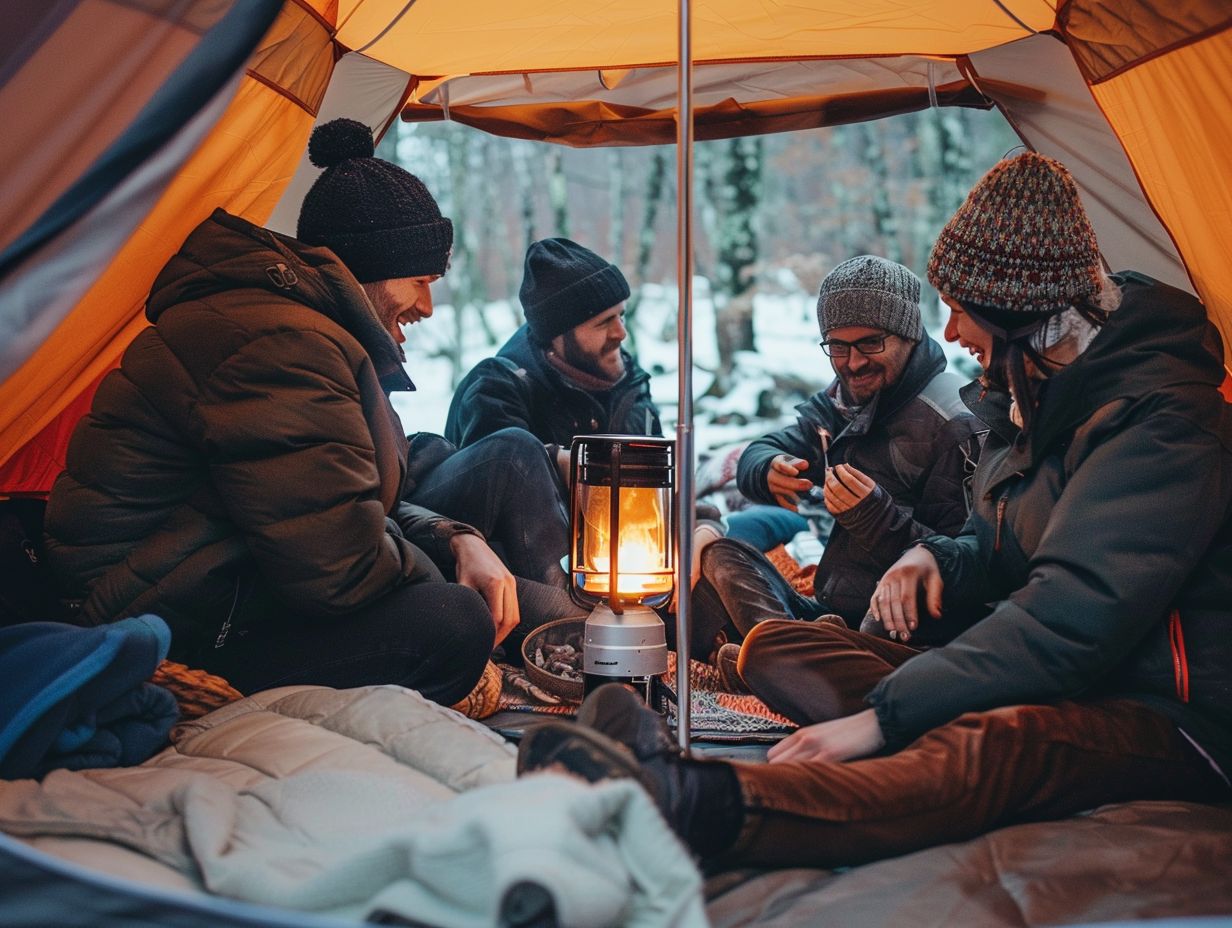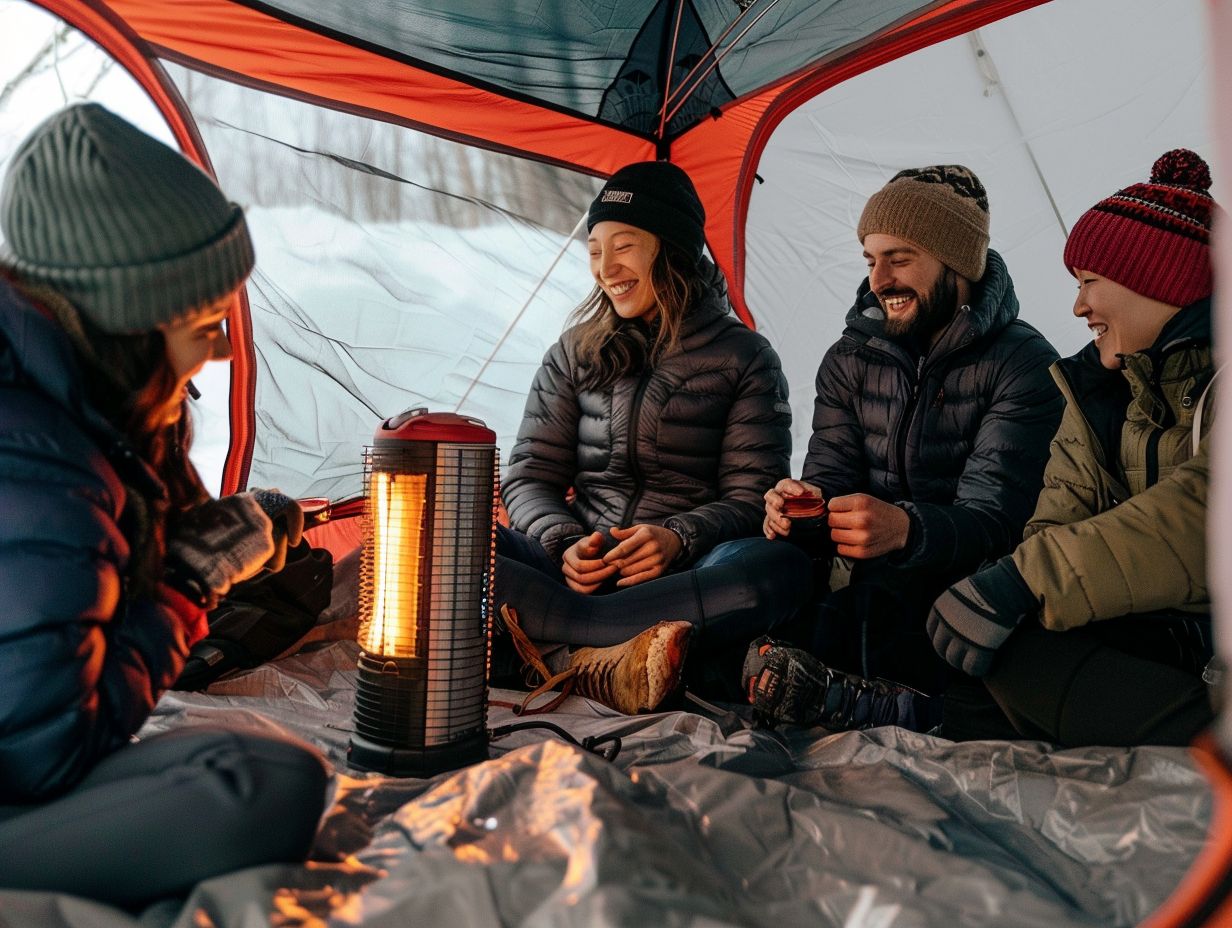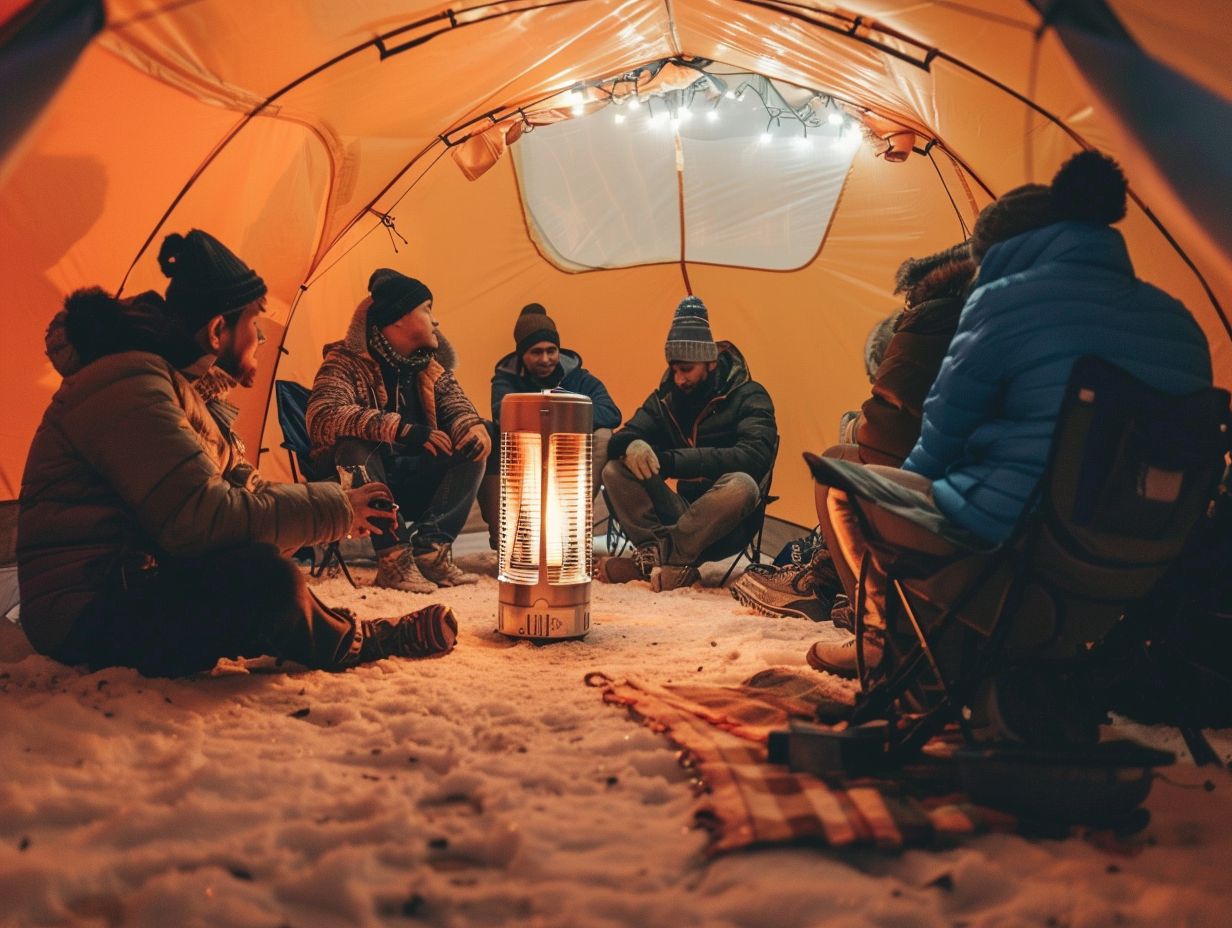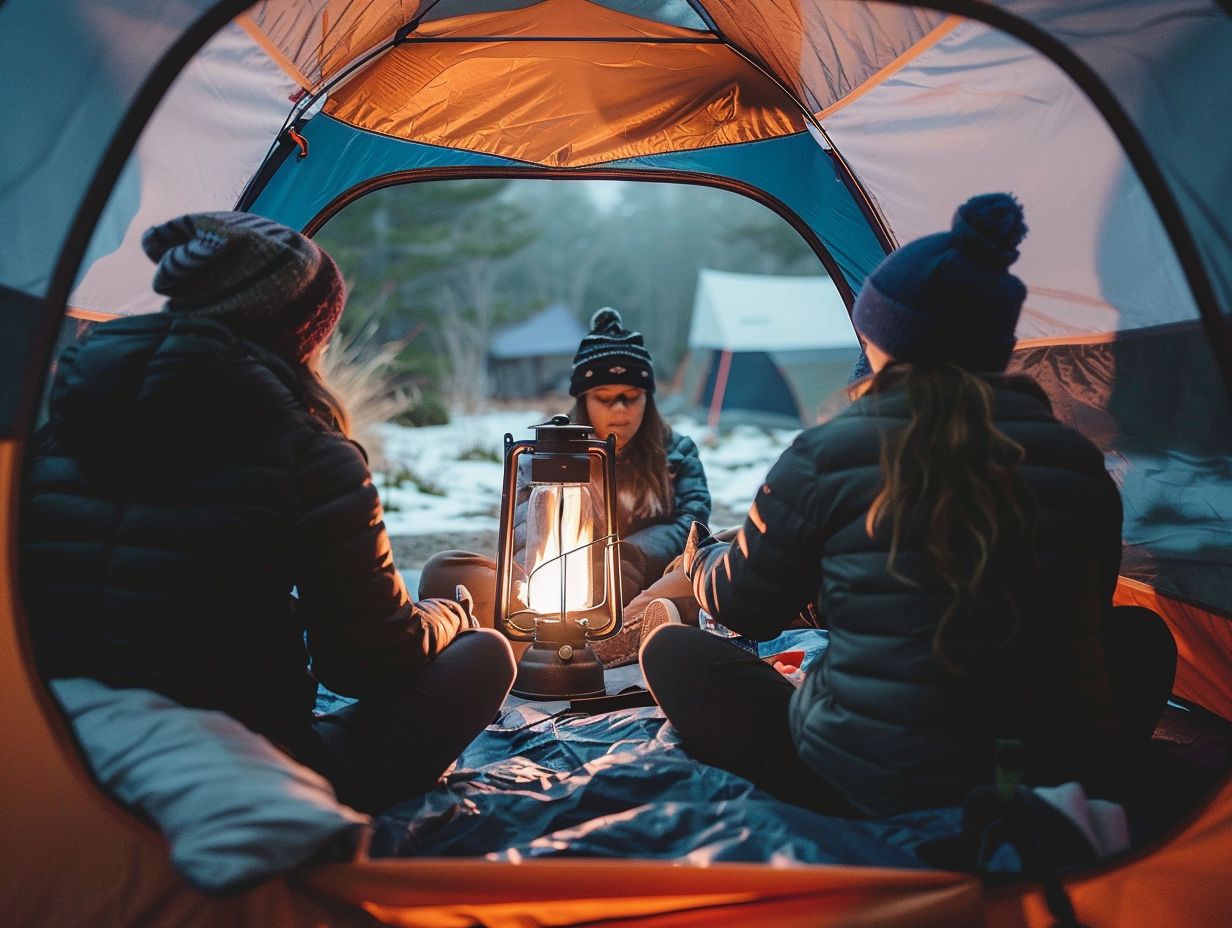If you are planning a camping trip and are seeking information on how to stay warm in your tent, this article will provide you with valuable insights. The content will cover the best portable heaters for tent camping, safety measures to keep in mind, strategies to optimise heat and efficiency, and additional tips.
Whether you have experience in camping or are a novice, this in-depth guide will assist you in selecting the appropriate portable heater, ensuring correct setup, and maintaining warmth and safety throughout your outdoor excursions. Let’s commence with the exploration!
Key Takeaways:

- Choose a portable heater specifically designed for tent camping that can provide enough heat for your tent size.
- Always follow safety precautions when using a portable heater in your tent, such as proper ventilation and keeping it away from flammable materials.
- Consider features, price, and energy efficiency when comparing portable heaters for tent camping, and make sure to properly set up and maintain your heater for maximum safety and effectiveness.
Choosing the Right Portable Heater for Your Tent
Selecting the ideal portable heater for your tent is crucial to ensuring a comfortable camping experience, particularly in colder conditions where maintaining warmth is essential. Factors like fuel type, size, heat output, and safety features are significant considerations in determining the most suitable heater for your requirements.
When considering portable heaters, propane heaters are favoured for their efficient heat output and fuel accessibility. Electric heaters provide a convenient option for locations with electricity access. Wood stoves offer a traditional and cosy atmosphere, but they necessitate a supply of firewood.
It is important to assess the heating capacity of the heater concerning the dimensions of your tent to guarantee effective warmth. Brands such as Mr. Heater are renowned for their quality and dependability, often featuring oxygen depletion sensors for enhanced safety during operation.
Safety Precautions to Consider When Using a Portable Heater in a Tent
Prioritising safety when using a portable heater in your tent is essential to prevent potential risks such as carbon monoxide poisoning, fire hazards, and oxygen depletion. Understanding proper ventilation, placement, and maintenance procedures can significantly reduce the dangers associated with heating devices inside enclosed spaces.
Ensuring adequate ventilation is crucial as it facilitates the dissipation of any carbon monoxide build-up that may occur when using a heater. It is recommended that you position your heater away from flammable materials to minimise fire hazards. Installing carbon monoxide detectors in your tent can offer an early warning in case dangerous levels are detected.
Regular maintenance and inspection of your heater are vital to ensure its optimal functioning and to promptly identify any potential issues. Establish a routine to clean filters, check for leaks, and adhere to manufacturer recommendations to guarantee safe heating conditions.
Top 5 Portable Heaters for Tent Camping
When exploring the best portable heaters for tent camping, you can enhance your outdoor experience by incorporating efficient and reliable heat sources. The market presents a variety of options, including well-known models such as the Mr. Heater Buddy, versatile propane heaters, and compact electric models tailored for camping convenience.
When determining which portable heater to procure for your camping excursions, it is crucial to consider factors like heating capacity, fuel efficiency, and ease of use. An excellent choice is the Mr. Heater Buddy, recognised for its sturdy build and capability to heat areas up to 225 square feet.
Users value its simplicity and ability to operate on propane, rendering it a versatile solution for various camping scenarios.
Another exceptional option is the Omnia Portable Electric Heater, celebrated for its small footprint, energy efficiency, and quiet performance. With a heating capacity of up to 110 square feet, this electric heater is ideal for smaller tents or personal use.
Comparison of Features and Prices
When analysing portable heaters for tents, you should consider features, prices, and your specific heating needs to make an informed decision. Factors such as BTU output, energy sources, portability, and warranty coverage are important to compare when selecting a heater for your camping trips.
With various portable heater models on the market, it is crucial to evaluate their unique selling points to ensure you choose a unit that meets all your requirements.
Utilising a comparison table can assist you in weighing the advantages and disadvantages of different heaters. Some models may prioritise easy setup procedures, while others may focus on fuel efficiency for longer usage.
Understanding any included accessories can improve your overall user experience during camping excursions.
How to Properly Set Up and Use a Portable Heater in Your Tent

Mastering the art of setting up and using a portable heater in your tent involves following specific guidelines to optimise warmth while ensuring safety precautions are in place. Proper installation, fuel management, and monitoring of the heater during operation are essential steps to enjoy effective heating without compromising on safety.
- To begin, choose a flat and stable surface inside your tent where you can place the heater. This precaution will prevent any accidental tipping over that could lead to potential hazards.
- Next, carefully connect the fuel source to the heater according to the manufacturer’s instructions, ensuring there are no leaks or loose connections.
Before igniting the heater, check for any unusual smells that may indicate a gas leak. Once everything is secure, follow the ignition instructions provided with the heater while ensuring proper ventilation inside the tent to avoid the risk of carbon monoxide poisoning.
Tips for Maximising Heat and Efficiency in Your Tent
To enhance heat retention and efficiency in your tent, it is crucial to improve the effectiveness of your portable heater for a consistent and warm camping experience. By implementing strategic tips such as insulating the tent, utilising reflective surfaces, and optimising airflow, you can maximise the heater’s performance while conserving fuel or electricity.
One critical aspect to concentrate on is insulating both the tent floor and walls to prevent heat loss. Adding layers of insulating material underneath and around your sleeping area creates a barrier that traps heat inside the tent. Additionally, utilising heat-absorbing materials like thick blankets or thermal blankets can further assist in retaining warmth.
It is important to block any drafts from entering the tent by sealing gaps or openings with weather-stripping or tape. Furthermore, adjusting your heater settings to a moderate level instead of constantly keeping it on high can help to maintain a comfortable temperature inside the tent without unnecessary energy consumption.
Common Questions and Concerns About Using Portable Heaters in Tents
Addressing common questions and concerns regarding the use of portable heaters in tents can help campers make informed decisions and prioritise safety during their outdoor adventures.
Understanding the risks associated with carbon monoxide exposure and troubleshooting heater malfunctions are essential components of providing comprehensive answers that can mitigate uncertainties and promote safe heating practices.
One of the primary frequently asked questions regarding the use of portable heaters in tents focuses on carbon monoxide safety. It is imperative to ensure that the heater is adequately ventilated to prevent the accumulation of this colourless, odourless gas, which poses a significant risk.
Campers frequently enquire about the ventilation requirements for their heaters, emphasising the necessity of sufficient airflow to reduce the potential for carbon monoxide poisoning.
Questions concerning fuel storage guidelines are prevalent, underscoring the importance of storing fuel in a secure location away from any potential ignition sources. Moreover, understanding emergency protocols in the event of heater malfunctions or accidents is crucial to ensure a safe camping experience.
The Benefits of Using a Portable Heater in Your Tent
When you bring a portable heater into your tent, you can enjoy a range of advantages. These include increased warmth, higher levels of comfort, extended camping seasons, and a cosy escape from the cold outdoor conditions.
The versatility and convenience of portable heaters make them essential companions for camping enthusiasts who want a more pleasant and relaxing outdoor experience.
A portable heater provides fast heating capabilities, allowing you to efficiently warm up your tent within minutes. With customisable temperature control options, you can tailor the heat output to your preferences, ensuring a comfortable setting throughout your camping adventure.
By using a portable heater, you can reduce your reliance on bulky blankets and layers of clothing, freeing up space in your tent and making it easier to move around. The ambient warmth generated by a portable heater helps you create a snug atmosphere, ideal for unwinding after a day of outdoor activities.
The Drawbacks of Using a Portable Heater in Your Tent
When considering the use of portable heaters in tent camping, you should be aware of both the benefits and drawbacks to ensure a safe and pleasant outdoor experience.
It is crucial to weigh the potential risks associated with portable heaters, such as fire hazards, oxygen depletion, fuel storage challenges, and limited heating capacity, before incorporating them into your camping setup.
In terms of safety, improper use or placement of portable heaters can pose a significant fire hazard, especially when positioned too close to flammable materials inside the tent. These heaters consume oxygen while burning fuel, increasing the risk of oxygen depletion in the enclosed space of a tent.
Additionally, the reliance on fuel for portable heaters may present difficulties in terms of accessibility and storage, particularly in remote camping locations. Furthermore, the limited heating capacity of portable heaters may not be sufficient to adequately warm larger tents or combat extreme weather conditions.
How to Stay Warm and Safe Without a Portable Heater

Exploring alternative methods to stay warm and safe without relying on a portable heater can be essential for outdoor enthusiasts facing equipment failures or fuel shortages during winter camping expeditions. Utilising strategies such as layering clothing, using thermal blankets, employing hot water bottles, and maximising body heat can offer effective solutions for maintaining comfort and safety in cold environments.
Along with these conventional methods, you can also consider constructing emergency shelters using available materials like snow, branches, and tarps to create insulated spaces that trap heat.
Building a fire using a safe method, such as a contained campfire or a portable stove, can provide warmth and a heat source for cooking. Packing high-energy, non-perishable foods and hot drinks can help sustain body temperature and provide essential nutrients in cold conditions.
Learning basic first aid skills and carrying a survival kit with items like matches, a torch, and a signalling device can be crucial for emergency situations.
Important Factors to Consider When Choosing a Portable Heater for Tent Camping
When selecting the right portable heater for tent camping, you need to evaluate several critical factors such as heating capacity, fuel efficiency, safety features, portability, and compatibility with your tent size and structure. Understanding these key considerations will help you make informed decisions and ensure a comfortable and secure heating experience during your outdoor adventures.
Pay attention to the BTU rating of the portable heater, as it indicates the heat output and efficiency of the unit. Fuel consumption rates are crucial in determining how long the heater can run on a single fuel source, especially in remote camping locations.
Opt for heaters with safety certifications to ensure peace of mind while operating the device inside the tent. A compact design makes transportation easier, while usability in various weather conditions prepares you for unpredictable outdoor scenarios.
How to Properly Store and Maintain Your Portable Heater
Effective storage and maintenance practices for your portable heater are essential to prolong its lifespan, ensure optimal performance, and prevent safety hazards, especially during storage in winter conditions.
Properly storing fuel, cleaning components, checking for leaks, and conducting routine inspections can safeguard your heater and preserve its functionality for future camping seasons.
Regarding fuel storage, make sure to empty the tank before long-term storage to avoid deterioration or blockages. Clean the filters and vents regularly to maintain good airflow and prevent potential fire hazards. Inspect the heater for any signs of leaks, such as unusual odours or visible drips, and address them promptly.
To prepare for winter storage, ensure all parts are clean and dry, and store the heater in a cool, dry place away from moisture and direct sunlight. Remember, regular maintenance is key to enjoying your heater safely and efficiently.
Reviews and Recommendations from Experienced Campers
By gathering insights from experienced campers through reviews and recommendations, you can gain valuable perspectives on the best portable heaters for tent camping. These insights often highlight real-world performance, durability, safety features, and overall satisfaction with different models. Learning from seasoned outdoor enthusiasts can serve as a guide for newcomers in selecting the most suitable heater for their camping needs.
One of the highly praised portable heaters among campers is the Mr. Heater Portable Buddy. Campers appreciate its compact design and efficient heating capabilities, making it a popular choice for chilly nights under the stars.
While some users have mentioned that it tends to be a bit loud, many find its user-friendly features such as the auto-shutoff function to enhance safety.
Additionally, the ECO mode on the Camco Olympian Wave-3 has impressed users with its energy efficiency. This mode provides a consistent heat output that effectively keeps tents warm without consuming excessive fuel.
The Future of Portable Heaters for Tent Camping
The future of portable heaters for tent camping offers exciting possibilities in terms of innovation, technology advancements, eco-friendly solutions, and enhanced user experiences. Anticipated developments in heating efficiency, safety features, sustainability practices, and smart heating controls are poised to revolutionise the camping industry, providing campers with a wider array of options for maintaining warmth and comfort while outdoors.
Energy-efficient designs are at the forefront of shaping the future of portable heaters, with manufacturers dedicating efforts to producing units that maximise heat output while minimising energy consumption.
The incorporation of renewable energy sources like solar panels and wind turbines into portable heater systems is increasingly common, offering campers sustainable heating alternatives.
The introduction of app-controlled heaters enables users to remotely adjust temperature settings, ensuring personalised comfort regardless of location. Enhanced safety measures, including automatic shut-off capabilities and advanced carbon monoxide detection, bolster camper safety when using heating devices.
Final Thoughts and Recommendations

When selecting a portable heater for your tent camping adventures, careful consideration of your heating needs, safety priorities, budget constraints, and environmental impact is essential.
Ensuring safety should be your top priority when using portable heaters in a tent. It is crucial to adhere to all manufacturer instructions, never leave the heater unattended, and keep flammable materials at a safe distance. Proper ventilation is also critical to prevent the risk of carbon monoxide poisoning.
Understanding factors such as BTU output, fuel types, and the size of your tent will assist you in choosing the most appropriate heater. Don’t forget to take into account the ease of use, durability, and portability when making your final decision.
In conclusion, selecting the best portable heater for your camping needs will improve your overall outdoor experience by keeping you warm and comfortable throughout your stay.
Frequently Asked Questions
What are the benefits of using a portable heater for tent camping?
Portable heaters provide warmth and comfort in cold weather, making camping more enjoyable and safe. They also help dry out damp air and prevent condensation from forming inside the tent.
What should I consider when choosing the best portable heater for tent camping?
When selecting a portable heater for tent camping, consider factors like size and weight, heat output, fuel type, safety features, and ease of use. It’s also essential to choose a heater that is suitable for the size of your tent.
What are the most common types of portable heaters for tent camping?
The most common types of portable heaters for tent camping are propane heaters, electric heaters, and battery-powered heaters. Each type has its advantages and disadvantages, so it’s crucial to choose the right one for your needs.
Are portable heaters safe to use inside a tent?
It’s crucial to follow safety guidelines when using a portable heater inside a tent. Make sure to read the manufacturer’s instructions and properly ventilate the tent. Also, never leave the heater unattended or use it while sleeping.
Can I use a portable heater for tent camping in all weather conditions?
It’s essential to choose a portable heater that can withstand the weather conditions in your camping area. Some heaters are designed for indoor use only, while others can be used in outdoor or extreme weather conditions. Always check the manufacturer’s recommendations before using a heater.
How do I maintain and store my portable heater for tent camping?
To ensure the longevity of your portable heater, it’s important to clean it after each use and store it properly. Follow the manufacturer’s instructions for maintenance and storage, and always check for any damages before using it again.



